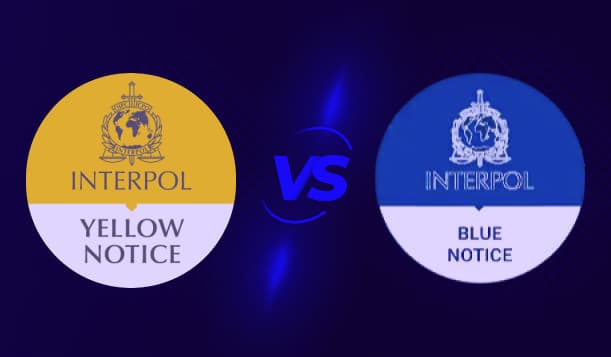Interpol takes an active role in ensuring international security by providing effective tools for tracking and locating people in different countries. Among them, the so-called blue and yellow notices are of particular importance. These two types of notifications serve different purposes, and understanding their functions can help you better navigate international people searches. Let’s look at what an INTERPOL Yellow and Blue Notice is, how they differ, and how to prevent misuse of the notices.
What is Interpol Blue Notices?
Interpol blue notice used to track the location of individuals or obtain additional information about them. It is often used in cases where it is necessary to find out where a person is going or collect information about his route.
The purpose of such a notification may be to collect information about a criminal suspect or witness who may provide important information to the investigation. However, remember that a Blue Notice does not imply arrest or any sanctions against the person named.
What is Interpol Yellow Notices?
Interpol yellow notice has a completely different purpose. It is aimed at searching for missing persons, including minors, or at identifying persons who cannot provide information about themselves, for example due to memory loss. These notifications are often used in cases involving child abductions or disappearances of vulnerable people. A Yellow Notice helps law enforcement agencies around the world coordinate their efforts and share information to find missing persons.
Key Differences Between Blue and Yellow Notices

The main difference between blue and yellow notifications is their purpose. A Blue Notice focuses on gathering information regarding the whereabouts of individuals who may be associated with an investigation. While a yellow notice is focused on finding missing people or identifying those who need help. Another important difference is the nature of the cases for which these notices are used. Blue notices are more likely to be associated with criminal investigations, while yellow notices are more likely to be associated with humanitarian cases.
Challenges in Managing Blue and Yellow Notices
Working with Interpol notifications is fraught with a number of difficulties. International cooperation requires fast and clear communication between law enforcement agencies of different countries. This is especially important when searching for individuals who may be moving between jurisdictions. It is necessary to transmit information in a timely manner and act in a coordinated manner in order to achieve a positive result.
Cross-Border Cooperation and Communication
One of the main challenges when working with notifications is to ensure effective interaction between countries. Different jurisdictions have different procedures and rules, which may slow down the exchange of information. Interpol plays a major role in coordinating these efforts, but without the active participation of member countries, success can be difficult.
Preventing Misuse of the Notice System
Another challenge is preventing abuse of the notification system. In some cases, countries may use Blue or Yellow Notices for political or other nefarious purposes. It is important that such cases are identified in a timely manner and that the notification mechanism is used strictly within the framework of international standards.
Importance of Legal Guidance for Notice Cases
When it comes to Interpol notices, especially blue and yellow notices, legal support is important. Understanding your rights and responsibilities helps you respond effectively to such situations. A qualified lawyer will be able to assess the legality of the notice and suggest options for action. This is especially true when it comes to international affairs, where different legal systems intersect and a comprehensive approach is required.
Knowledge of Interpol Blue and Yellow Notices allows you to better understand how international mechanisms for searching and sharing information work. It is important to understand the differences between these notices and be prepared to work with professionals should such situations arise.
